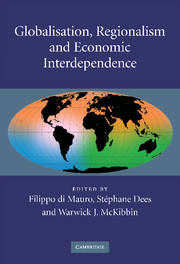Book contents
- Frontmatter
- Contents
- List of figures
- List of tables
- List of contributors
- Preface
- Introduction
- 1 International linkages in the context of global and regional integration
- 2 Trade integration of the central and eastern European countries and China: has it reached potential?
- 3 Patterns and determinants of production fragmentation in world manufacturing trade
- 4 Going global: trade, internationalisation of production and domestic performance of euro area firms
- 5 Globalisation and the trade channel in the euro area
- 6 Gauging the labour market effects of international trade openness: an application to the US manufacturing sector
- Index
- References
5 - Globalisation and the trade channel in the euro area
Published online by Cambridge University Press: 02 September 2009
- Frontmatter
- Contents
- List of figures
- List of tables
- List of contributors
- Preface
- Introduction
- 1 International linkages in the context of global and regional integration
- 2 Trade integration of the central and eastern European countries and China: has it reached potential?
- 3 Patterns and determinants of production fragmentation in world manufacturing trade
- 4 Going global: trade, internationalisation of production and domestic performance of euro area firms
- 5 Globalisation and the trade channel in the euro area
- 6 Gauging the labour market effects of international trade openness: an application to the US manufacturing sector
- Index
- References
Summary
Introduction
At times since the late 1990s the strong performance of the global economy has appeared to find little correspondence with euro area activity, casting doubts on the strength of the trade channel in the euro area (see figure 5.1). This is a puzzle, given the very open nature of the euro area – at least, as far as its component economies are concerned. Three main questions arise from this finding. First, whether the possible changes in the trade channel are attributable to globalisation, particularly the entry of new global players in world trade, such as China – a factor that is shared by other major developed economies. Second, whether and how the phenomenon relates instead mostly to regional factors, in particular to the interaction between economies participating in the monetary union. Third, whether there are reasons to believe that the phenomenon is bound to persist. This chapter looks at external trade impacts on the euro area and analyses how those impacts are transmitted to the euro area against the background of the various possible structural effects that are related to the ongoing and rapid rise in globalisation. The interaction of globalisation and regional forces represents the main focus.
The chapter analyses, first, the impact of world trade movements on exports outside the euro area.
- Type
- Chapter
- Information
- Globalisation, Regionalism and Economic Interdependence , pp. 102 - 125Publisher: Cambridge University PressPrint publication year: 2009
References
- 1
- Cited by



